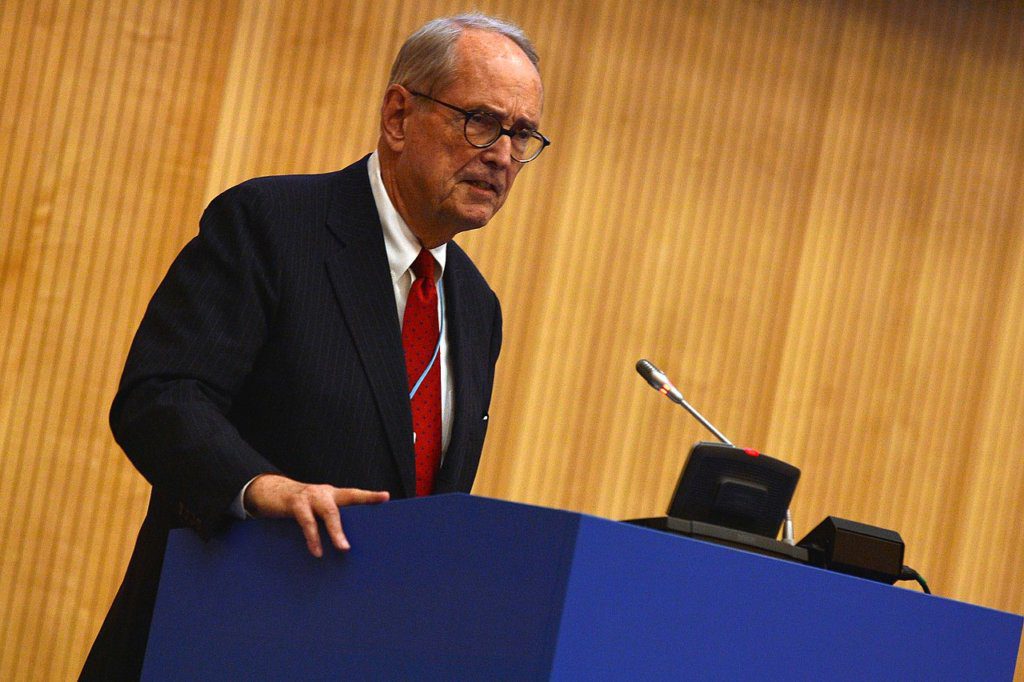Richard ‘Dick’ Thornburgh, 1932-2020
By • January 7, 2021 0 1404

On the last day of 2020, in a nursing home near Pittsburgh, his birthplace, Richard “Dick” Lewis Thornburgh died at age 88 of natural causes.
The only Republican to serve two successive terms as governor of Pennsylvania, from 1979 to 1987, Thornburgh provided principled and effective leadership during a major public health emergency: the 1979 nuclear accident at Three Mile Island.
The nation’s first and, to this day, most destructive nuclear power plant accident — a partial meltdown of the plant’s unit 2 reactor — occurred on March 28, 1979, just weeks after Thornburgh assumed the governorship and only 10 miles south of the state capital in Harrisburg.
“There was no formula for dealing with a nuclear meltdown,” wrote the New York Times, but “trained in civil engineering and the law” — at Yale and the University of Pittsburgh School of Law — “Mr. Thornburgh was accustomed to dealing with the cold, hard facts of science and statutes. But facts were hard to come by in the maelstrom of chaos and fear after the partial meltdown.” Radiation was leaking from the site and “persistent confusion over what had happened and the extent of the danger, compounded by dire warnings by antinuclear activists, left the public disconcerted.”
Thornburgh immediately took charge of the crisis, calling in experts, reviewing the scientific data and moving to reassure the public. He took the prudent step of evacuating pregnant women and young children within a five-mile radius around the plant, but tamped down exaggerated public fears of an imminent reactor explosion.
“You have to reassure people,” he said, “You have to go before the cameras and microphones and tell them what you know and what you don’t. You have to stop the rumors, and, of course, you have to make decisions. There isn’t any Republican or Democratic way to deal with a nuclear crisis.” After visiting Three Mile Island, President Jimmy Carter — who had served as an engineering officer in the U.S. Navy — praised Thornburgh’s “superlative” performance.
As a Republican governor in a mostly Democratic state, Thornburgh forged bipartisan alliances and helped transform western Pennsylvania’s struggling economy from one based on heavy industry to a more diverse one based on services. He oversaw investment while cutting waste, balancing budgets and leaving surpluses for his successor.
Thornburgh fought for reform and against corruption in every public position he held. Under five U.S. presidents — both Democratic and Republican — he served in the Justice Department combating crime and corruption. As under-secretary-general for administration at the United Nations from 1992 to 1993, he sought to reduce corrupt practices related to international aid distribution and misappropriation by local officials. Later, he fought to reform World Bank practices in a similar vein.
Devastating personal and family tragedies infused Thornburgh with deep empathy. In 1955, he married his childhood sweetheart, Virginia “Ginny” Hooton. Tragically, in 1960, she was killed in an automobile crash that also left one of their three sons, Peter, with severe brain damage. “I learned how fragile life can be and how limited our time is to do something useful with it,” Thornburgh said. In 1963, Thornburgh married another “Ginny” — Ginny Judson — and the couple dedicated themselves to helping those with disabilities.
As U.S. attorney general, appointed by President Ronald Reagan in 1988 — to help clean up corruption associated with Thornburgh’s predecessor, Edwin Meese III, and the Iran-Contra affair — Thornburgh not only secured convictions of corrupt bankers, defense contractors and public officials, he facilitated the passage of the landmark Americans with Disabilities Act in 1990. Barring discrimination against people with physical, mental and sensory disabilities, the legislation, signed by President George H. W. Bush, who had retained Thornburgh as attorney general, expanded the scope of civil rights protections further than in decades.
Thornburgh’s public service extended into the current century. Following the terrorist attacks of 9/11, he helped lead a special commission to improve the FBI’s ability to handle domestic terror threats. “Where the Evidence Leads: An Autobiography,” published in 2003, not only recounts his extraordinary career, but, as its title makes clear, emphasizes the respect for evidence-based reasoning that has, unfortunately, been far too rare in American public life.

